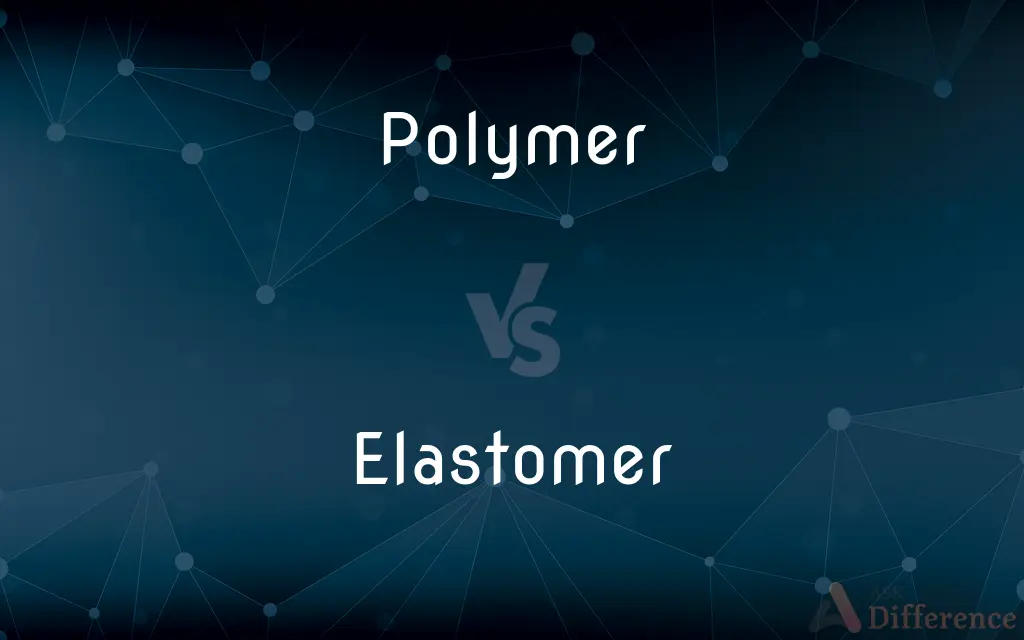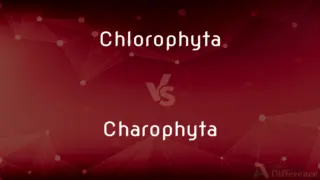Polymer vs. Elastomer — What's the Difference?
By Tayyaba Rehman — Updated on September 19, 2023
Polymer is a broad category of large molecules made up of repeating structural units. Elastomer is a specific type of polymer characterized by its ability to stretch and return to its original shape.

Difference Between Polymer and Elastomer
Table of Contents
ADVERTISEMENT
Key Differences
Polymers are large, complex molecules made up of smaller, repeating units known as monomers. These monomers can be identical or different, leading to a wide variety of polymer types with different properties. Elastomers, on the other hand, are a specialized subset of polymers that have the distinct ability to be stretched to significant lengths and return to their original dimensions when the stress is removed.
Polymers can be found in various forms and functions, such as plastics, fibers, and even natural substances like DNA and proteins. Elastomers, specifically, are often used in products that require flexibility and resilience, like rubber bands and certain seals and gaskets. Polymers can be rigid or flexible, whereas elastomers are, by definition, flexible and elastic.
Polymers can be synthesized through various processes, including addition polymerization and condensation polymerization. These processes involve chemically bonding monomers together. Elastomers are also synthesized similarly but are specially formulated to have elastic properties. Both polymers and elastomers can be natural or synthetic.
The applications for polymers are vast, ranging from structural materials to adhesives. Elastomers, due to their unique stretch and recover characteristics, are generally confined to applications that require these properties. Although all elastomers are polymers, not all polymers are elastomers, making the term "elastomer" a more specialized designation within the broad category of polymers.
Comparison Chart
Broad or Specific
Broad Category
Specific Type
ADVERTISEMENT
Flexibility
Varies
Highly Flexible
Chemical Structure
Varies
Specifically Formulated
Applications
Diverse (Plastics, fibers, etc.)
Limited (rubber bands, seals)
Natural or Synthetic
Both
Both
Compare with Definitions
Polymer
Varies in rigidity and flexibility.
Polymers can be engineered to be rigid like in PVC pipes.
Elastomer
A polymer that can stretch and return to its original shape.
Elastomers are used in rubber bands.
Polymer
Large molecules made of repeating units.
Polyethylene is a polymer used in plastic bags.
Elastomer
Known for high flexibility.
Elastomers are key in making flexible seals.
Polymer
Synthesized from monomers.
Polystyrene is a polymer made from styrene monomers.
Elastomer
Generally synthetic but can be natural.
Natural rubber is an elastomer.
Polymer
Can be natural or synthetic.
DNA is a natural polymer.
Elastomer
Specific applications due to elasticity.
Elastomers are used in the automotive industry for gaskets.
Polymer
Used in a variety of applications.
Polymers are used in textiles, plastics, and even medicines.
Elastomer
Special formulation for elastic properties.
Silicone elastomers are specifically formulated for flexibility.
Polymer
A polymer (; Greek poly-, "many" + -mer, "part") is a substance or material consisting of very large molecules, or macromolecules, composed of many repeating subunits. Due to their broad spectrum of properties, both synthetic and natural polymers play essential and ubiquitous roles in everyday life.
Elastomer
An elastomer is a polymer with viscoelasticity (i.e., both viscosity and elasticity) and with weak intermolecular forces, generally low Young's modulus and high failure strain compared with other materials. The term, a portmanteau of elastic polymer, is often used interchangeably with rubber, although the latter is preferred when referring to vulcanisates.
Polymer
Any of numerous natural and synthetic compounds of usually high molecular weight consisting of up to millions of repeated linked units, each a relatively light and simple molecule.
Elastomer
Any of various polymers having the elastic properties of natural rubber.
Polymer
(organic chemistry) A long or larger molecule consisting of a chain or network of many repeating units, formed by chemically bonding together many identical or similar small molecules called monomers. A polymer is formed by polymerization, the joining of many monomer molecules.
Elastomer
Any polymer having the elastic properties of rubber
Polymer
A material consisting of such polymer molecules.
Elastomer
Any of various elastic materials that resemble rubber (resumes its original shape when a deforming force is removed)
Polymer
Any one of two or more substances related to each other by polymerism; specifically, a substance produced from another substance by chemical polymerization.
Polymer
A naturally occurring or synthetic compound consisting of large molecules made up of a linked series of repeated simple monomers
Common Curiosities
How do Polymers and Elastomers differ?
Polymers are a broad category, while elastomers are a specialized type of polymer with elasticity.
Are all Elastomers Polymers?
Yes, all elastomers are a specific type of polymer.
Can Polymers be rigid?
Yes, polymers can be rigid or flexible based on their structure.
What is an Elastomer?
An elastomer is a type of polymer with the ability to stretch and recover its shape.
Are Elastomers always flexible?
Yes, elastomers are characterized by their flexibility.
What are common uses for Polymers?
They are used in plastics, fibers, and various other applications.
Can Polymers be recycled?
Some polymers can be recycled, depending on their type.
What is a Polymer?
A polymer is a large molecule made up of repeating structural units.
Are there natural Polymers?
Yes, examples include DNA and proteins.
What are common uses for Elastomers?
They are commonly used in rubber bands, seals, and gaskets.
Can Elastomers be recycled?
Some elastomers can be recycled, but it is often more difficult due to their elastic properties.
How are Elastomers made?
Like polymers, elastomers are made from monomers but are formulated to be elastic.
How are Polymers made?
Polymers are made by chemically bonding monomers together.
Are there natural Elastomers?
Yes, natural rubber is an example.
Is the term 'Elastomer' more specialized than 'Polymer'?
Yes, elastomer is a more specialized term, describing a specific subset of polymers with elastic properties.
Share Your Discovery

Previous Comparison
Microaerophilic vs. Capnophilic
Next Comparison
Chlorophyta vs. CharophytaAuthor Spotlight
Written by
Tayyaba RehmanTayyaba Rehman is a distinguished writer, currently serving as a primary contributor to askdifference.com. As a researcher in semantics and etymology, Tayyaba's passion for the complexity of languages and their distinctions has found a perfect home on the platform. Tayyaba delves into the intricacies of language, distinguishing between commonly confused words and phrases, thereby providing clarity for readers worldwide.
















































